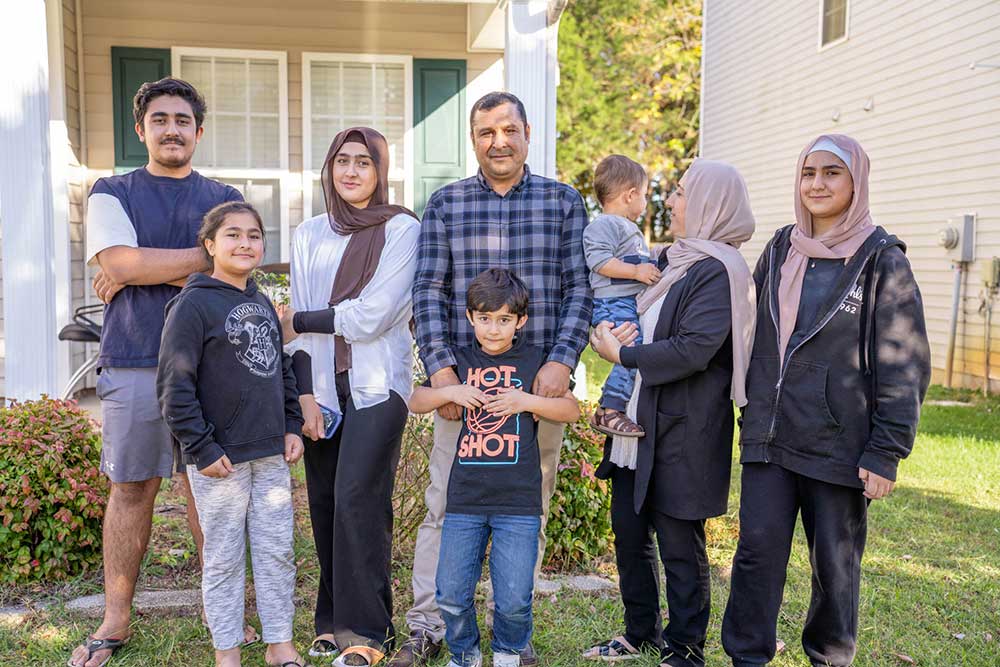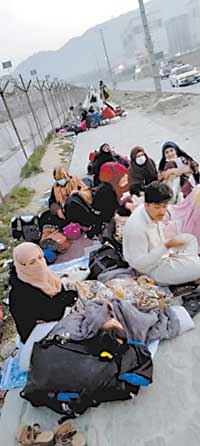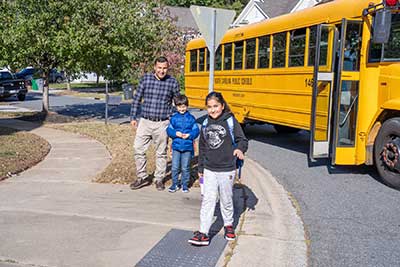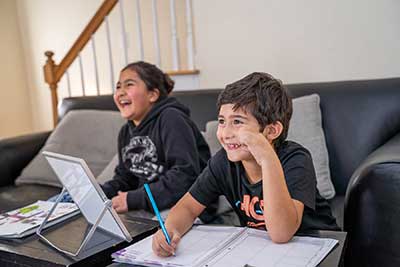Home in America
 Mohammad and his family have settled into a new home in Charlotte, thanks to help from Catholic Charities and other organizations, and they are pursuing asylum status to remain here permanently. He and his wife are relieved their children are all back in school, and their eldest son is thinking about college. (Photos by Alex Cason | Catholic News Herald)CHARLOTTE — A year after 250 people were evacuated from Afghanistan to Charlotte and Asheville, a new phase of their resettlement is under way as Catholic Charities helps guide them through the complex process of securing a long-term home in the United States.
Mohammad and his family have settled into a new home in Charlotte, thanks to help from Catholic Charities and other organizations, and they are pursuing asylum status to remain here permanently. He and his wife are relieved their children are all back in school, and their eldest son is thinking about college. (Photos by Alex Cason | Catholic News Herald)CHARLOTTE — A year after 250 people were evacuated from Afghanistan to Charlotte and Asheville, a new phase of their resettlement is under way as Catholic Charities helps guide them through the complex process of securing a long-term home in the United States.
All of the families evacuated to western North Carolina through Catholic Charities now have housing, jobs and income to support themselves – with children in school, access to medical care and networks of assistance. The refugees’ focus now is on reuniting with family left behind and on traveling to Washington, D.C., for immigration interviews that will determine their futures.
Mohammad’s family is among them. A year ago, he and his wife huddled with their six children on the streets outside the Kabul airport, desperate to flee as the Taliban regime took over control of Afghanistan. Mohammad dreamed of a safe place to raise his family, where his three daughters could attend school without fear of gunfire and bombings, where his oldest son could seek higher education and his younger sons would also have brighter futures.
After a grueling evacuation in which his family was shuttled first to Qatar, then a U.S. military base, and finally to North Carolina, Mohammad said he is grateful.
“We’re thankful to Catholic Charities and to the whole nation for the opportunity to be here,” said Mohammad (identified by his first name for security reasons).
“We’re thankful to be safe and glad for the opportunity to live a normal life.”
Upon the evacuees’ arrival in Charlotte, Catholic Charities provided several months of intense resettlement services – finding housing, securing medical care, and placing them in jobs and schools. Now, caseworkers for the agency’s resettlement office are shuttling families to Washington for immigration interviews and assisting with other needs – as they also support new additional refugees from Ukraine and other war-torn places around the world.
“The Afghan evacuees are adjusting really well,” said Laura Jones, Catholic Charities Diocese of Charlotte’s resettlement director. “If you think about where they were a year ago, chasing planes on the tarmac to flee their country, few could have imagined the stable lives they’d be leading in a matter of months.”
Over the past year, Jones said: “We’ve seen babies born and young people start college. We’ve seen a number of reunifications, where family left behind were able to join their loved ones in Charlotte. And almost all of the Afghan families are staying here – we’ve seen very little out-migration, which is not the case in other areas.”
Since October 2021, Catholic Charities has resettled 252 Afghan evacuees in Charlotte and Asheville, as well as 132 additional refugees from more than a dozen countries. More recently, the agency has provided services for 129 Ukrainian refugees arriving in the Charlotte diocese as “sponsored arrivals” of the government’s
“United for Ukraine” program, following Russia’s attacks on the country that began in March.
The Catholic Church is one of the nation’s largest refugee resettlement agencies. In partnership with dioceses across the country, the Church through the U.S.
Conference of Catholic Bishops resettles approximately 18 percent of the refugees who arrive in the U.S. each year.
“It is the mission of the Church and the Charlotte diocese to welcome the stranger as we are guided to do by Scripture,” Jones said. “Right now that means a Herculean effort by Catholic Charities to help our Afghan evacuees through the immigration process. We’re committed to helping every Afghan win asylum and establish new lives in this country.”
STARTING OVER IN CHARLOTTE
 Mohammad and his family spent two nights waiting outside the gates of the Kabul airport in August 2021, desperate to escape the increasing threat from the Taliban. (Photo provided)Mohammad, whose strong English-language skill has opened opportunities, worked a variety of jobs in Afghanistan – from assisting U.S. efforts to build infrastructure and communities to operating a shop selling perfume and cosmetics.
Mohammad and his family spent two nights waiting outside the gates of the Kabul airport in August 2021, desperate to escape the increasing threat from the Taliban. (Photo provided)Mohammad, whose strong English-language skill has opened opportunities, worked a variety of jobs in Afghanistan – from assisting U.S. efforts to build infrastructure and communities to operating a shop selling perfume and cosmetics.
Life grew chaotic in 2019 as violence began to threaten his family’s safety, so he pulled his daughters out of school and kept everyone closer to home. Mohammad and his wife, whom he says he consults on everything, knew the family wouldn’t be safe after U.S. forces suddenly withdrew from the country in August 2021 and the Taliban took control.
So, with few belongings and with their 5-month-old baby and five other children in tow, the couple raced to the Kabul airport to flee. There was gunfire and huge crowds in the streets as they made their way. They spent two nights waiting outside the airport gates, keeping to themselves, fearful the Taliban would arrive to confront them.
Mohammad and his family were among the lucky ones. Their names were called, they boarded a flight out, and they left their homeland behind. After a brief stay in Qatar, the family flew to Fort McCoy in Wisconsin, where they lived for three months in a dormitory with five other families.
In late November, Mohammad and his family were relocated to a hotel in Charlotte – and three weeks later they moved into their own home, a rented house in the suburban Highland Creek neighborhood. A number of organizations have rallied around his family, including The Independence Fund and the Allies program.
Now, Mohammad works as a human resources recruiter for a bridge and highway building company. He has his own car and his wife is studying for her driver’s license test. She is looking for a job as a tailor. The couple is relieved their children are all back in school, and their eldest son is thinking about college and a career in engineering.
“The kids are doing well,” Mohammad says. “They are learning every day, getting better with the language, and doing better every day.”
A PATH TO CITIZENSHIP
With all the Afghan evacuees settled into new lives in North Carolina, Catholic Charities has shifted to helping navigate their path to long-term residency and possibly citizenship.
Evacuees were granted temporary status to remain in the country upon arriving, and the federal government has since extended that to two years. During that time, evacuees must apply for asylum, then a green card. Five years after that, they can seek permanent citizenship.
Catholic Charities’ resettlement office has a network of attorneys helping these families navigate this process. Case coordinators and volunteers are driving families to Arlington, Va., near Washington, for government interviews about their lives and activities in Afghanistan. So far, 25 evacuees have secured status changes and by the end of October, 160 of their Afghans clients will have completed an asylum interview.
Once Mohammad’s family is granted asylum, his son can apply for college and financial assistance.
Yet their worries aren’t completely behind them yet. Mohammad is also focused on reuniting with several family members still in Afghanistan – including his mother and a brother.
WELCOMING THE STRANGER
 Emergency evacuees like the Afghans and other refugees are often victims of war, political upheaval and religious, economic or ethnic persecution. Many are forced to leave their homes, jobs and families simply to stay alive. They pay taxes in the U.S. and repay the government their travel expenses on their way to establishing new lives.
Emergency evacuees like the Afghans and other refugees are often victims of war, political upheaval and religious, economic or ethnic persecution. Many are forced to leave their homes, jobs and families simply to stay alive. They pay taxes in the U.S. and repay the government their travel expenses on their way to establishing new lives.
The Biden administration recently announced it would welcome up to 125,000 refugees in fiscal year 2023, which began Oct. 1. A similar number was expected last fiscal year, but U.S. State Department figures show just 25,465 refugees were resettled nationally – a pipeline slowed by the pandemic and a more limited approach to immigration during the previous administration.
The U.S. Conference of Catholic Bishops has said it remains committed to the Church’s long tradition of welcoming immigrants fleeing war, violence, natural disasters, political instability and persecution.
Auxiliary Bishop Mario E. Dorsonville of Washington, chairman of the USCCB’s Committee on Migration, said recently that as the number of refugees returns to higher levels, the conference will continue to “embrace this ministry given to us by Jesus,” and that “we look to the president and Congress for their continued support of a robust resettlement program, consistent with our national values.”
With financial assistance from the U.S. bishops, Catholic Charities accompanies refugees for up to five years, providing housing, health care, schools, community and cultural orientation, and budgeting and financial education. They also offer employment assistance, driver’s education, interpretation services and transportation to initial appointments.
Looking ahead, diocesan resettlement director Jones expects her office to help settle 315 more refugees in Charlotte this fiscal year, and 120 in Asheville.
As just one immigrant making a new life in Charlotte, Mohammad said he is committed to contributing positively.
“We are in a good situation. We are safe now, and we have the opportunity to work and to live without the tension of war,” he said. “We appreciate everything the U.S. has done for us. I need to thank the whole nation and the U.S. government for giving us this opportunity. Now, I just want work hard, support my family and my community and my country.”
— Kimberly Bender. Catholic News Service contributed
How can you help?
 At www.ccdoc.org: Find out how to volunteer or donate to help the Refugee Resettlement Offices in Charlotte and Asheville welcome refugees. Financial contributions are welcome. Currently, new and gently used coats of all sizes are needed.
At www.ccdoc.org: Find out how to volunteer or donate to help the Refugee Resettlement Offices in Charlotte and Asheville welcome refugees. Financial contributions are welcome. Currently, new and gently used coats of all sizes are needed.
By the numbers
As partners in state and federal programs, Catholic Charities Diocese of Charlotte provides a variety of resettlement services for refugees from around the world. More than 14,000 refugees have been resettled in western North Carolina since the program began in 1975.
252: Afghan evacuees settled in Charlotte and Asheville since October 2021 – nearly all settled over three months last fall as part of an emergency federal program
132: Refugees settled in Charlotte and Asheville under the regular federal program since October 2021. From: Afghanistan, Burma, Congo, El Salvador, Honduras, Iraq, Moldova, Somalia, Sudan, Syria and Ukraine
129: Ukrainian refugees assisted in the diocese since March 2022


